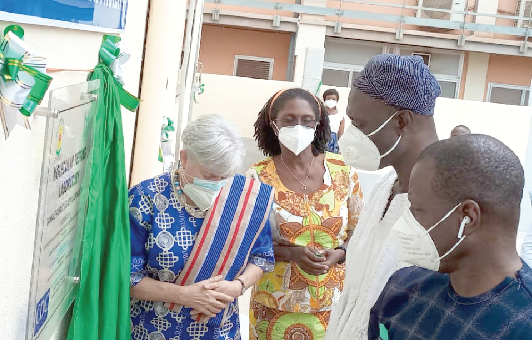
US Ambassador inaugurates health facilities in Tamale
The United States (US) Ambassador to Ghana, Ms. Stephanie S. Sullivan, has inaugurated two health sector intervention facilities in Tamale, the Northern regional capital, to improve emergency response in that region and other neighbouring regions.
The Molecular Laboratory Testing Centre at the Tamale Teaching Hospital (TTH) and the Northern Regional Emergency Operations Centre (EOC) are to help in surveillance, real-time data and diagnosis, and for rapid response to future pandemics.
The two facilities were made possible through collaboration among the US government and its Centre for Disease Prevention and Control (CDC), the government of Ghana and the Noguchi Memorial Institute for Medical Research of the University of Ghana.
Inauguration
At separate inauguration ceremonies in Tamale yesterday, Ms. Sullivan said the pandemic had exposed the need to localise public health capacity specifically in the areas of workforce development, surveillance, laboratory and emergency management and response, and that a section of central control and command centres at all levels of health system was essential to the effective coordination of COVID-19 response strategies.
“We are in the pandemic now, but all the experts tell us there will be more pandemics in the future so these emergency operation centres will have plenty of work to do in the future. It's not just going to work till the end of this pandemic,” she stated.
She added that the regional emergency operation centres were part of the sustainable approach to build resilient public health infrastructure in Ghana that would bring together important stakeholders and experts to generate locally owned and sustainable solutions in a public health crisis.
“The US government looks forward to building on decades of partnership with the government of Ghana to further strengthen its health system with the global health security agenda most importantly to support the health of Ghanaians,” she stated.
Objective
The Director-General of the Ghana Health Service, Dr. Patrick Kuma-Aboagye, indicated that the regional EOC would help the service respond promptly and effectively to public health risks and emergencies.
“The objective is not just to have a national EOC, but to have an EOC in all regions. However, the full operation of the EOC is hinged on the functionality and coordination of regional EOCs,” he said, adding that that had become necessary because of the migration to e-surveillance where all our surveillance data were electronically captured, making it easy for real-time data access.
“It is worth noting that it will support other regions in the northern zone until other EOCs are established in these regions. It is going to serve initially as a hub to support other regions, while we work towards establishing their own EOCs. The region is encouraged to ensure effective use and maintenance of this facility to benefit the region and all the people in the sub-region,” he stated.
The Northern Regional Deputy Director of Health in charge of Clinical Care, Dr. Braimah Abubakari, said the EOC would serve as a fulcrum for technical coordination of public health emergencies in the response structure, and would, therefore, serve as the physical location for the coordination of real-time information and resources for timely detection of disease outbreaks and other public health events for effective response.
